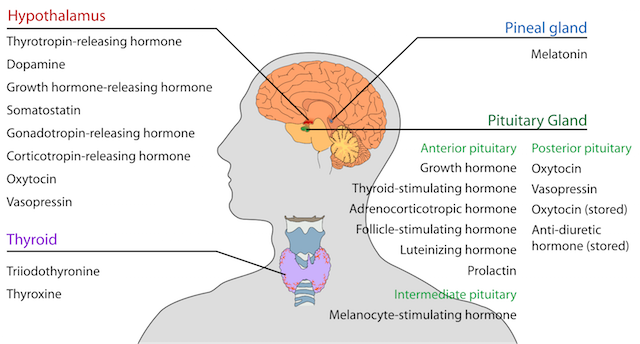

Image: Endocrine central nervous system
~
Sperm count rates are lower than ever. What’s causing it, and what can you do to increase sperm health?
Recently, NBC News shared a shocking report: in a single generation, sperm count and concentration has plunged more than 50 percent among men in the West.
Scientists from the Hebrew University in Jerusalem and Icahn School of Medicine in New York analyzed 185 studies from 1973 to 2011, a review involving 43,000 men. From a public health perspective, what they found couldn’t be more startling. Results showed a 52 percent decline in sperm concentration, and a 59 percent decline in total sperm count.
What’s causing this relatively sudden plunge?
In a few words: our modern lifestyle.
Our contemporary diet, lifestyle, stress levels, occupational exposure to chemicals, and environmental toxins create a stew of adverse health affects. And since general health is usually an indicator of fertility health for men, this is one of those moments where we realize, in pretty stark terms, just how critical it is to take care of our own lives if we hope to generate new ones.
The good news is this: on an individual level, there are many remedies you can take to reverse poor sperm health.
Here are some solid starting points:
Toxin Exposure through Food? Buy Smart.
What you put in your mouth has a direct effect on hormone function, and healthy hormone function is the foundation for good sperm health. We know that being overweight, and probably insulin-resistant, creates more inflammation in the body, which affects fertility. It also leads to more estrogen production instead of testosterone production, and when you’re trying to improve sperm count and motility, the latter is what you need.
Choose organic foods to avoid exposure to toxins found in conventionally grown foods. There is research showing that some environmental chemicals, called obesogens, promote obesity by acting as endocrine disruptors. In making the conscious decision to buy organic, you can minimize the burden of potentially toxic chemicals in your body, and help prevent weight gain and insulin resistance.
Now listen: we can’t possibly be angels every time we eat. But we can supply our body with the nutrients it needs to feed our hormones. So in addition to buying organic, reach for omega-3 fat-rich foods: these will bring down your body’s level of inflammation, and help stabilize hormone levels as a result. Flaxseeds, hemp seeds, and chia seeds all pack enormous nutritional power at just a few spoonfuls each, and can go right into your soups and smoothies.
Lack of Nutrients? Supplement.
In a perfect world, we would get all the nutrition we need from food alone—but that’s just doesn’t happen for most of us in the modern Western world.
Through his diet, a man could technically be getting “enough” nutrients according to charts appropriate for his height and weight. But often, once absorbed into the body, those nutrients are likely being used for more urgent matters than sperm health—detoxing from toxin exposure, for example, if the man is around chemicals often.
That’s why the right herbs and supplements are important to give men the extra nutrients they need to increase sperm count and motility. I highly recommend supplements containing L-carnitine, which helps to formulate healthy sperm, as well as ferulic acid (found in Dong Quai), which improves sperm quality. The one I’ve found that contains both of these is Fertility Blend for Men, which gets extra points for using green tea, Vitamins C and E, and selenium in its formula—all powerful antioxidants that up sperm quality. It’s also one of the few natural supplements on the market that has university research studies behind it to support its efficacy, and it’s got a long track record.
There’s also Chinese ginseng, which not only is proven to help men with erectile dysfunction, but also supports healthy circulation without causing changes in blood levels of testosterone (critical for the overall issue of sperm health). It has also been known to help boost sex drive in men, and supports endocrine health through its actions on the adrenal hormones.
Too much Stress and not enough Sleep? Give your Body, and Adrenals, a Rest.
Many men (and for that matter, women) I know can function just fine on a less-than-adequate night’s sleep, but it’s different when you’re hoping for a baby. Meager sleep wreaks havoc on circadian rhythms, which affect multiple systems in the body, from your endocrine system to your neurotransmitters, and can adversely affect your ability to conceive.
Additionally, getting a handle on adrenal health by reducing stress is critical. When your body is constantly in a state of adrenaline and cortisol-fueled frenzy, inflammation follows—and soon, both your DHEA and testosterone levels are shot. In this vein, what I highly recommend to all of my patients is rest, meditation, and relaxation: it’s not indulgent! It will give you back your health—and possibly, your ability to conceive.
~
~
Author: Dr. Laurie Steelsmith
Image: Wikimedia; Incase/Flickr
Editor: Callie Rushton
Copy Editor: Travis May
Social Editor: Waylon Lewis






Read 0 comments and reply